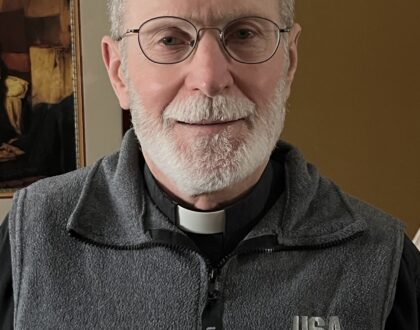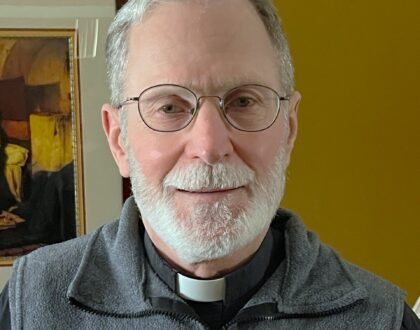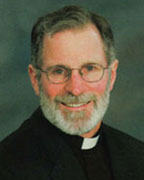Homily, Divine Mercy 2024

From The Pastor
To fully realize the power and new life of the Resurrection there must be an experience of the pain and loss of a real death. The transforming awareness of new life and love is only realized in the surrendered acceptance of a real loss. Death can only change a beloved survivor into new life, meaning, and purpose through a journey of loss and recovery. Such a journey has steps and stages that moves each person in their own unique way.
Consider the experience in the Upper Room with the fearful disciples behind locked doors. They are in the trauma, confusion, and loss of their beloved Jesus. Their hopes are crushed. Their faith in the power and Lordship of Jesus seems to be as dead as his body. Feeling the mood and dark energy in the room, consider the shock of Jesus appearing before them. Jesus says, “Peace be with you.” As evidence, he shows them the physicality of his wounded hands and side.
This is a premier encounter of grace. To say they ‘rejoiced’ would be an understatement of shock and joyous confusion. Jesus repeats, “Peace be with you. As the Father has sent me, so I send you. He breathes on them saying, “Receive the Holy Spirit. The sins you forgive are forgiven, and the sins you retain are retained.” Everything changes in an instant yet takes the rest of their lives to understand and fulfill.
This is the Pentecost scene in St. John’s gospel. The journey from death to the new life of the Resurrection depends on the action and acceptance of the Holy Spirit. The Holy Spirit is the love of God and only love has the power to transform death into new life. Consider these words. They are true spiritually, emotionally, psychologically, morally, and physically. Every aspect of the human personality is contained within the spiritual nature of our identity. We are spiritual beings, and any true human transformation can only happen through the action of the Holy Spirit.
For those present, this was a two-fold movement. In the presence of Jesus, his word of peace frees the disciples from fear, guilt, and confusion that begins the healing of the Lord’s death. Seemingly instantaneous, the disciples still had to process and accept the reality of Jesus’ death, his scourging, humiliation, and shame. These images were not simply deleted from their mind’s eye, nor were they intended too. An emotional and psychological process had to take place. Jesus did die a tortuous death for the sake of defeating the power of evil and our personal sin. Now they see him alive. Enter the action of the Holy Spirit.
Jesus breathes on them. Breath is an action of the Holy Spirit that gives or creates new life. The breath of love animates new life within and beyond the trauma, loss, and separation of death. Not only physical death, but also spiritual death. Sin is spiritual death. This is part of the journey to new life. Forgiveness brings new life in the willingness to let sin go, surrendering it to the love of Jesus and the power of his Cross. Conversely, to retain sin or bind sin in unforgiveness leaves a person or persons bound in the unfreedom of fear and guilt. Only in the Holy Spirit are we able to realize the new life of the Resurrection in the forgiveness of our sin and our merciful forgiveness of the sins of others.
The transforming power of the Spirit is given another expression in the story of Thomas. Why is this story included? It was likely a real event. It is also pertinent to many believers today. A part of Thomas is in each of us. This is another step in the process from death to new life. Death is often denied, or at least accepted only on the surface. Even more resisted is the belief of life after death. Many people are ‘have to see it to believe it’ kind of people. Notice that Jesus accepts with patience the stubborn resistance of Thomas. Jesus allows his need to see and touch his wounds. The exchange confirms the Lord’s death as well as the reality of his Resurrection in his living presence. Thomas could only surrender in humility: “My Lord and my God.” Jesus councils, “Do not persist in unbelief, but believe.” This too is an action of the Holy Spirit.
To accept the reality of life after death, we are compelled to surrender our old ways of knowing, thinking, relating, and being. The Resurrection of Jesus changes everything. Life after death in the body changes the meaning and purpose of how we live. In the fruit of redemption, we are restored to our original nature. Reconciled in the death of Jesus, we are given new life and full relationship with God. We exist in the love of God for the purpose of loving.
On this Mercy Sunday, consider your new life in the power of the Risen Christ. Now reconciled in Christ, the doors are unlocked and wide open for you to have a full and rich relationship with God. Let go of fear, guilt, and unforgiveness. Die to all that is not life giving in yourself and embrace the gift of love that is the Holy Spirit. The Spirit is given. Make a conscious act of acceptance to receive the power of this redeeming love.
Father John Esper
Recent Sermons

Homily, April 6, 2025
April 05, 2025

Homily, March 30, 2025
March 27, 2025

Homily, March 23, 2025
March 20, 2025

